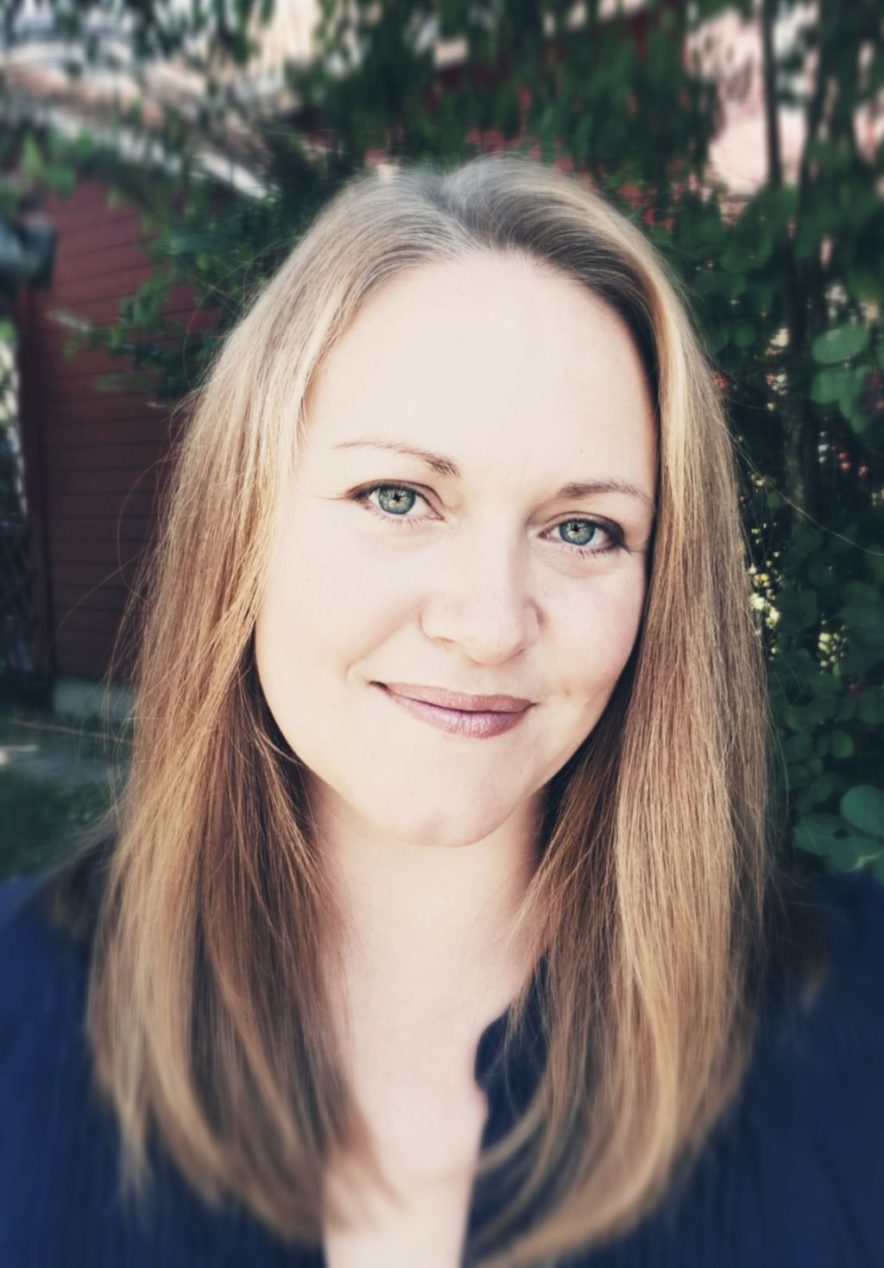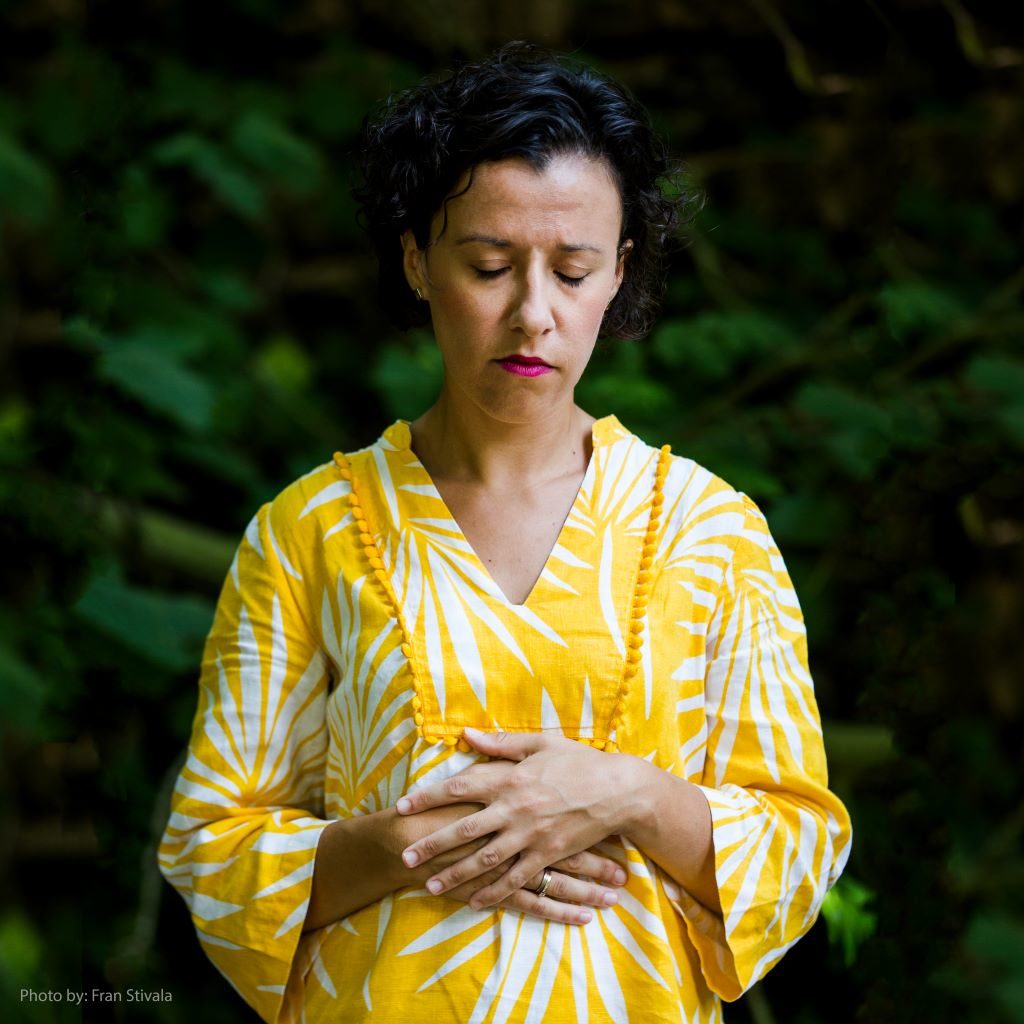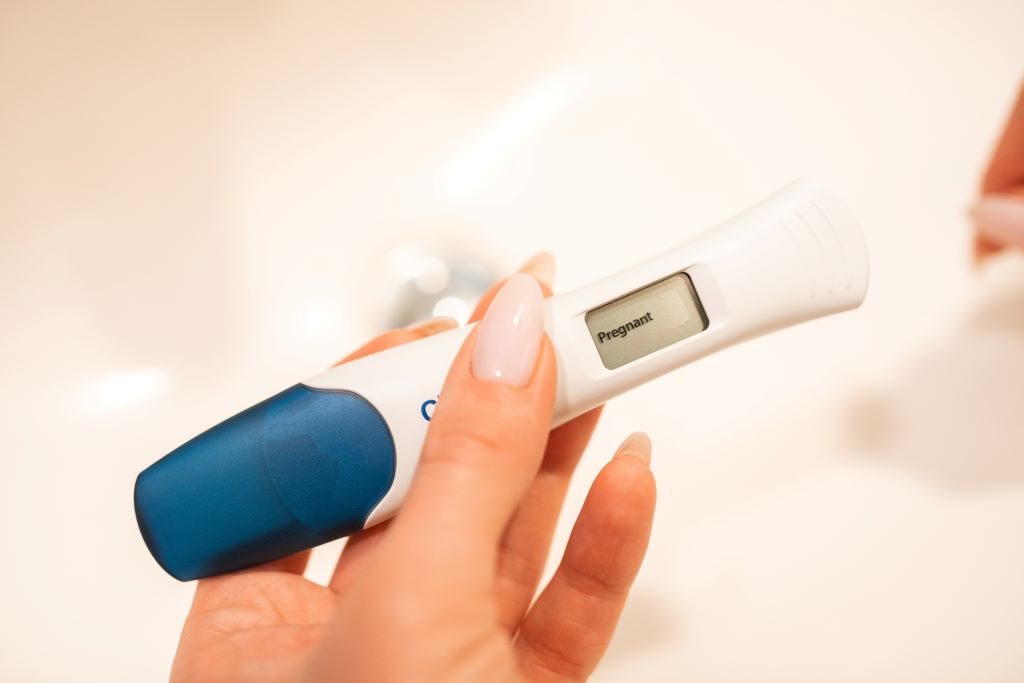
From the moment those two lines appear on your positive pregnancy test, your life changes. Apart from a mix of emotions that can be even more heightened due to those increasingly raging pregnancy hormones, suddenly you find yourself anxious about the next steps you need to take, both for your pregnancy journey as well as for your baby.
We at wham thought of making it simpler for you by compiling a list of all services available to women living in Malta and Gozo who have just got a positive pregnancy test. No matter what your personal situation is, you will definitely find services you can make use of throughout this new journey…
Family Planning Advisory Service (FPAS)
Understandably, a pregnancy may be unexpected, and some women may experience shock and disbelief as soon as they get a positive pregnancy test. Family Planning Advisory Service (FPAS) is the first pro-choice family planning helpline and advisory service of its kind in Malta, and it is free of charge. FPAS is run by trained volunteers, supported by medical and social professionals, who can provide reliable information to people in Malta on reproductive healthcare and options available. FPAS volunteers are pro-choice and can help clients whatever their decision.
Health
Your first step should be to start taking Folic Acid, which is crucial for the formation of your baby’s spine and brain during the pregnancy. You may also find some more tips in an article written by Dr Natalie Psalia: Pre-Pregnancy Advice, which can help both if you have already conceived, as well as if you’re planning to. Moreover, you can also find detailed information about all Nutrition During Pregnancy by nutritionist Ariana Zarb.
Once there is a positive test the patient should seek medical advice, either from her own OBGYN or her GP. The doctor has 2 options: refer to Mater Dei Hospital Antenatal Clinic or else see her before referral at a later stage.
At MDH a consultant will be assigned. This could be chosen by the patient or a random one is assigned. Choice depends on who the private OBGYN of choice is, as doctors work in teams. The patient’s own doctor will guide the patient who to book with.
A blue card will be provided during the first visit and booking bloods are taken. These are routine blood tests offered in pregnancy. There is no need to fast for these tests.
The patient can choose to continue visits under the NHS or else mixed private / NHS. Low risk NHS patients are seen at the local Health Centre or at Mater Dei by specialists or trainees that work with the patient’s consultant.
Wherever the patient is seen, during every visit the patient’s blood pressure and urine are checked, together with an assessment of fetal growth and fetal heart activity. This is done manually (abdominal palpation, abdominal measurement and doptone to hear the heart beat) or via ultrasound (not at Health Centres).
Visits are scheduled monthly until 30 weeks, then every 2 weeks until 34 – 36 weeks (depending on patient and doctor), then weekly until delivery, assuming pregnancy is low risk and no issues arise.
Depending on who the private OBGYN is, technically the patient needs to open the file at MDH during the booking and then return to MDH at the end for delivery. Once records are kept on the Blue Card (hence the importance of taking it for every visit) there is no need to have visits at MDH to update the file.
A list of obstetric and gynaecology practitioners can be found here.
Ultrasound Scans
Ideally the first scan is done at around 8 weeks to assess for fetal heart presence and to check the location of the pregnancy, especially in women with a high risk of ectopic pregnancy (e.g. history of ectopic pregnancy, previous STDs & pelvic surgery).
It is very important to get a proper scan between 11 and 14 weeks. This is to confirm viability, calculate exact age of pregnancy (last menstrual period is not that accurate), and number of fetuses. This is a dating scan and can be done at Mater Dei or at the patient’s private OBGYN of choice.
Screening in the first trimester can be opted for, but this is not offered at MDH. Screening is identifying who is at high risk of having a disease. It is not diagnosing whether there is a condition or not.
In the first trimester a Nuchal Scan (with or without blood tests) or non-invasive prenatal testing (just blood) can be chosen. The scan screens for chromosomal abnormalities, structural issues and also acts as a dating scan. Non-invasive prenatal testing just screens for the common chromosomal conditions.
In the second trimester a Fetal Anomaly scan is advised. This can be done at MDH or privately. This helps in detecting certain fetal abnormalities. This would trigger a cascade of events including multidisciplinary management and extra scans.
In the third trimester at least one growth scan is advised and if there are concerns about growth Doppler assessment can be added. Just because a Doppler is booked it does not mean that there is a problem.
It is vital that these scans are done by trained healthcare professionals. Routine scans are not aimed at picking up fetal abnormalities, and no scan has a 100% detection rate. There is always an element of uncertainty in pregnancy.
Group B Streptococcus (GBS)
Group B Streptococcus is a bacterium that can be found in the perineum. In adults there are no symptoms but presence of GBS can be very dangerous for babies whilst being born vaginally. It can cause severe infections, including meningitis, and can even cause death. A low vaginal swab between 35 and 37 weeks is recommended so that if GBS is present antibiotics can be started once membranes rupture or when in labour.
Benniena Health Social Workers
With pregnancy frequently come along a thousand questions. Some questions can be as easy as how to break the positive pregnancy test news to family members. Benniena is a free service offered by professional Health Social Workers through Mater Dei Hospital, where you can talk about your feelings, even if you feel the need for a new positive outlook to your fast-changing life. Here you can rest assured that you will not be judged. This service is also extended to the father of the baby as well as grandparents. You may contact Benniena, Social Work Office, Mater Dei Hospital, on 2545 5577 or 2545 5571.
‘Servizz Għożża’ for Teenage Pregnancies
Servizz Għożża provides support to teenage mums 18 years and under, as well as their boyfriends and families, through an educational programme tailored for the girls’ needs. Here they are provided with any needed counseling services to be able to deal with all the educational, emotional and psychological issues that an unplanned positive pregnancy test during teenage life may bring.
Servizz Għożża provides encouragement and empowerment to the future young mum by helping her adopt a positive attitude towards motherhood whilst keeping a balance between being a mother as well as a teenager. Additionally, the young mother is also encouraged to pursue her studies, with the team Head of Schools, Guidance Teachers, Counselors and Midwives and any other needed professionals to facilitate this aim.
More services include guidance in legal and social aspects related to teenage pregnancy, as well as outings related to the content of the sessions provided. As for grandparents, Servizz Għożża offers a safe space where they can discuss issues and concerns, and where they are also encouraged to build a healthy relationship with the teenage mum. Additionally, another program is also offered for the teen mothers – ‘Mother and Baby Support Group’, where they are offered a supportive and nurturing environment as well as different creative sessions that encourage parenthood responsibility and obligation to cherish their infant.
More information about this service can be achieved through [email protected] or 2598 6145/6/7.
Parentcraft Services
Parentcraft Services is a free-standing Unit, forming part of the Obstetric Department and situated at Level 1, Block E, Mater Dei Hospital. Parentcraft Services offer education and support during and after the pregnancy.
While gathering information for this article I had the pleasure to talk with the very dedicated Charge Midwife and Parentcraft Services Coordinator, Louise Bugeja, who took the time to explain in detail the many educational opportunities that are being offered through this unit. Ms Bugeja explained that education is mainly carried out through team meetings offered to expectant mothers/couples, mothers with twin pregnancies, grandparents, and mothers with consecutive pregnancies. Mothers are grouped with each other based on the estimated month of delivery, and participation can be face-to-face as well as online. All groups are then invited to a general group, which currently hosts over 2,500 members, where certain modules and informative updates are uploaded.
Post-natal sessions are also offered through Parentcraft, which serve as an educational tool since many queries are answered directly by qualified midwives. Another great initiative is also offered post-birth through a Facebook page named Ask The Parentcraft Midwife where mothers can ask questions and discuss issues related to themselves as well as their newborns, and have them answered by these amazingly helpful midwives.
I highly recommend Parentcraft services! I have made use of this service when pregnant with my own daughters in the past, and from my observation it is evident that this service, which was always great, is now excellent! For more information you may contact Parentcraft Services on 25455123, 25455124 or 25455127, or check out their Facebook page at https://www.facebook.com/parentcraftmalta. For anyone who would like to apply to any of the services mentioned, Ms Bugeja has provided the file below which consists of an application form you may easily download. Once you fill in the form kindly email it to [email protected]
Ms Bugeja was so kind as to also send us this very informative document with all contact details which every pregnant woman may need…
Please note that due to the COVID-19 pandemic, it is advisable to call MDH Operator on 2545 0000 and ask to be put through to the desired emergency service, since many changes have had to be made due to the current situation.
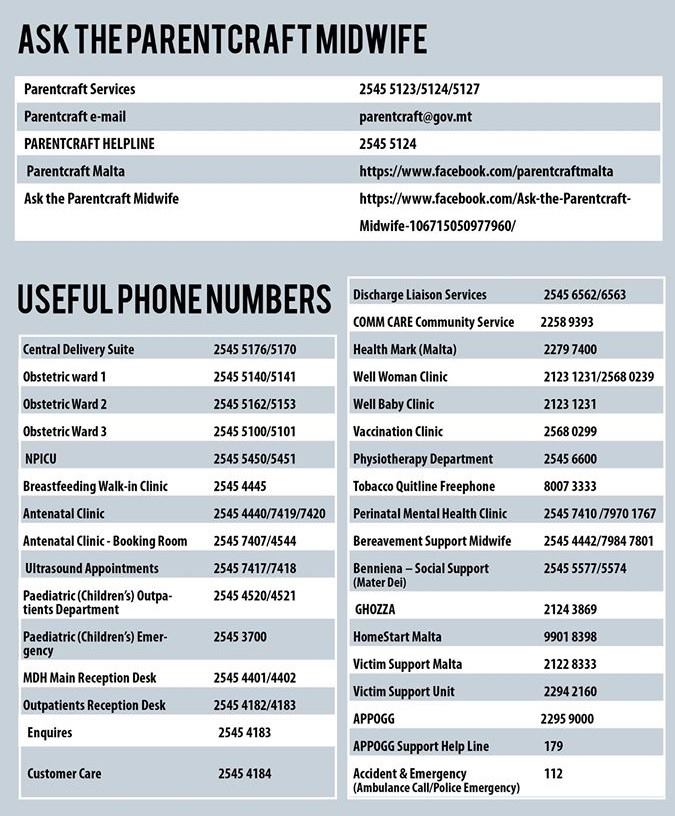
Midwives and Doulas
Right from the moment a mother gets a positive pregnancy test as well as during and after the birth, she goes through a rebirth herself. With this change come also a lot of questions, doubts and fears.
Having a midwife to talk to, to reassure you about the whole process, from pregnancy to the birth phase and after the birth can be very helpful, and eases any tension and worries that may be surfacing throughout any of these phases. A midwife is a professional with the ability to guide you throughout the whole birth process, giving you the best advice necessary, administering particular pain medication that you may need so your baby’s birth will go as smoothly as possible. At Wham we have already met Emma Beck, an amazing midwife and psychotherapist who also runs the Sweet Valley Family Clinic in B’Kara. As a midwife Emma sees prospective mothers and works together with gynaecologists at her clinic to offer the best care possible for both mother and baby.
Similarly, doulas can also offer support before, during and after the birth. If you are not familiar yet with the term doula, you can check out an article about what a doula is, written by Chiara Cortesi, a doula herself.
Whilst doulas do not go into the medical aspect of the pregnancy and birth, they can provide excellent help in various ways. Crystal Presttun, another doula, has compiled a very interesting list of 20 ways in which a doula can help you.
Hospital List
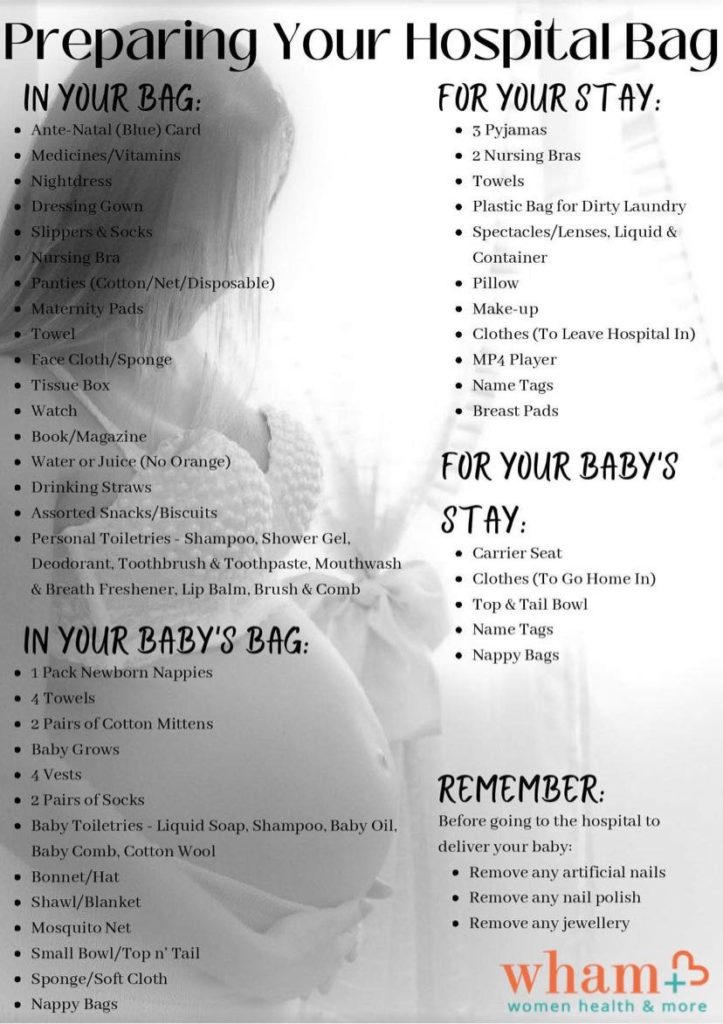
Other Helpful Products
Although not always necessary, there are products apart from those listed in the Hospital list that really help make things easy when caring for a newborn baby, adjusting to motherhood as well as continuing to take care of your growing family. As a mother I personally know things could have been much harder if it wasn’t for such products! Here are a few innovative products that can be of help to you too…
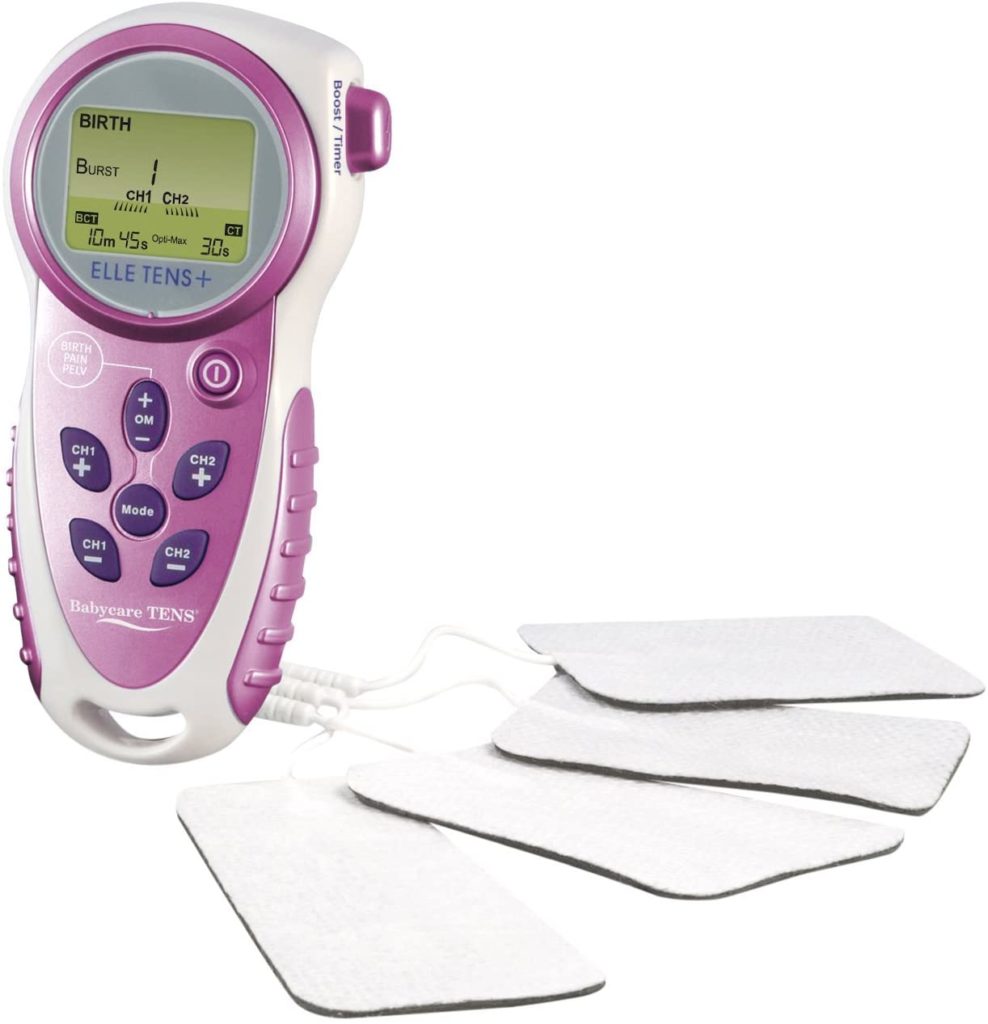
TENS Machine for Birth Pain, General Pain & Pelvic Floor Toning
As a mother of three I must say that contractions during labour especially with two out of three of my birth experiences, as well as pelvic floor issues post-pregnancy, have left an impact on me in the past. So when I found out about this innovative product I must say I felt I had to share this!
The amazing Elle TENS Plus is ‘3 units in 1’ plus a contraction timer! It is undoubtedly the ultimate maternity TENS machine – ideal for all your labour and post-labour needs. The Elle TENS Plus is quite simply the best in drug free pain relief for birth, general pain and pelvic floor toning.
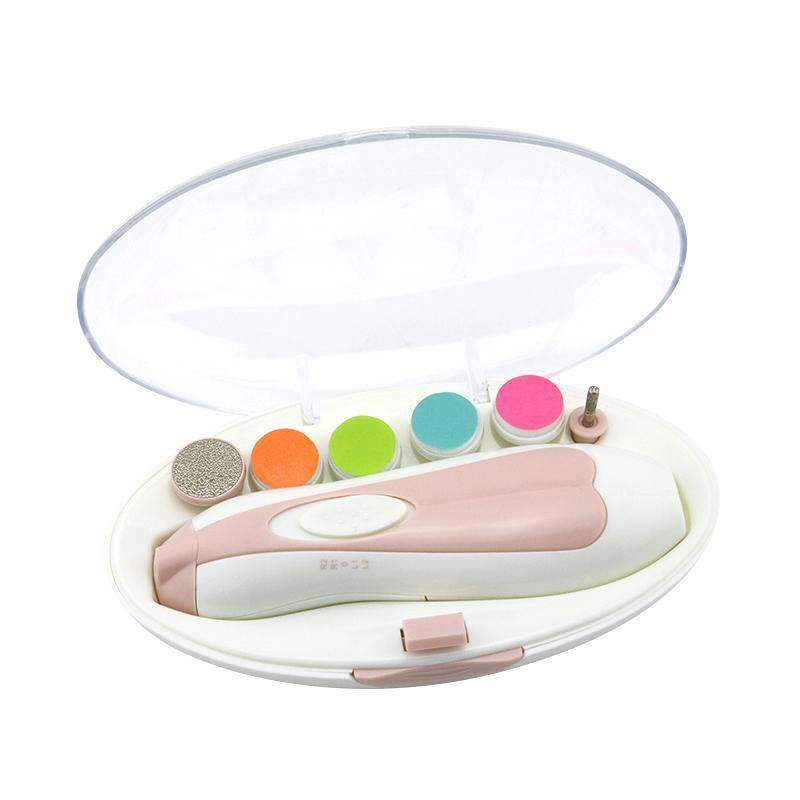
Baby Nail Care
Let’s face it, trimming a baby’s nails isn’t as easy as one may think! Delicate small soft fingers with equally small soft nails…it’s easy for nail trimming to become a fearful event! Well, not anymore…
The Haakaa Baby Nail Care Set lets you safely trim down your baby’s nails without the need for sharp scissors!
Simply attach the trimmer pad suitable for your child’s age and gradually file down their nails! The trimmer pads make your baby’s nails smooth and don’t leave sharp edges that may scratch their delicate skin. This nail care set also includes a metal pad and cone so parents can file down their nails too!
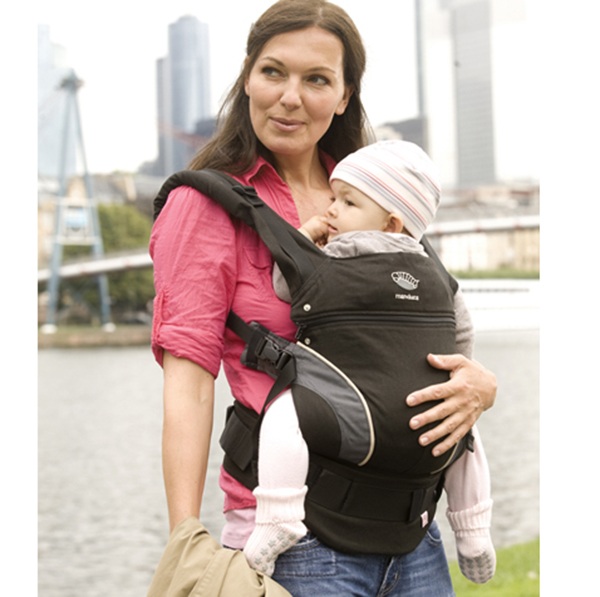
Baby Carriers
Baby Carriers are very helpful especially for those mothers who need to tend for other young children. Additionally, carrying a baby close to you helps provide extra comfort and reassurance, making this an ideal product for mothers of babies who tend to cry a lot. Ask for ergonomic baby carriers, which are designed to provide additional support to the baby’s hips, due to the babies’ legs being placed in the recommended M position.
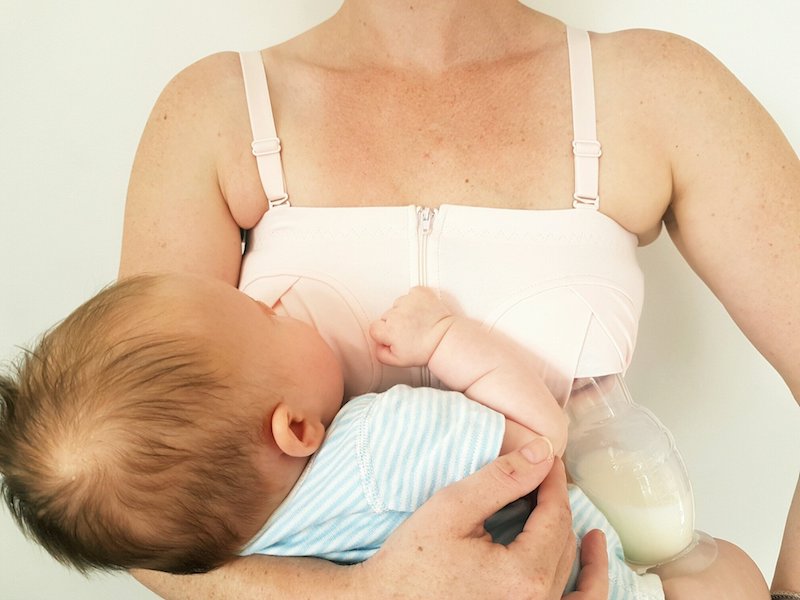
Breast Pumps
If you are breastfeeding, then a breast pump is a must! This allows you to easily pump out breastmilk so your baby can be breastfed even by other family members. It will also provide you with that much needed me-time, and is especially helpful when planning to go back to work. Pumping from one breast whilst breastfeeding your baby from the other will promote a higher flow of milk with the least effort possible…plus it’s less time consuming!
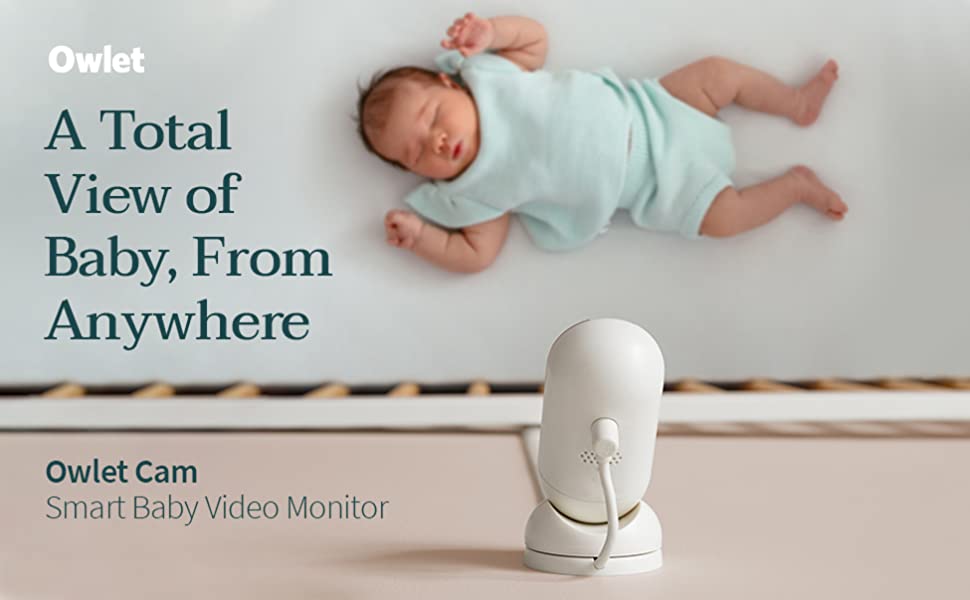
Baby Video Monitor
Let’s face it, as a new mother, you may find it very hard not to monitor your baby all the time. If you are planning to put your baby to sleep in the nursery or in another bedroom, then a baby video monitor is a must. It allows you to watch your baby’s movements live via a mobile app. The ideal monitor should provide you with a two-way audio with which you can listen to and talk to your baby, as well as night vision capability.
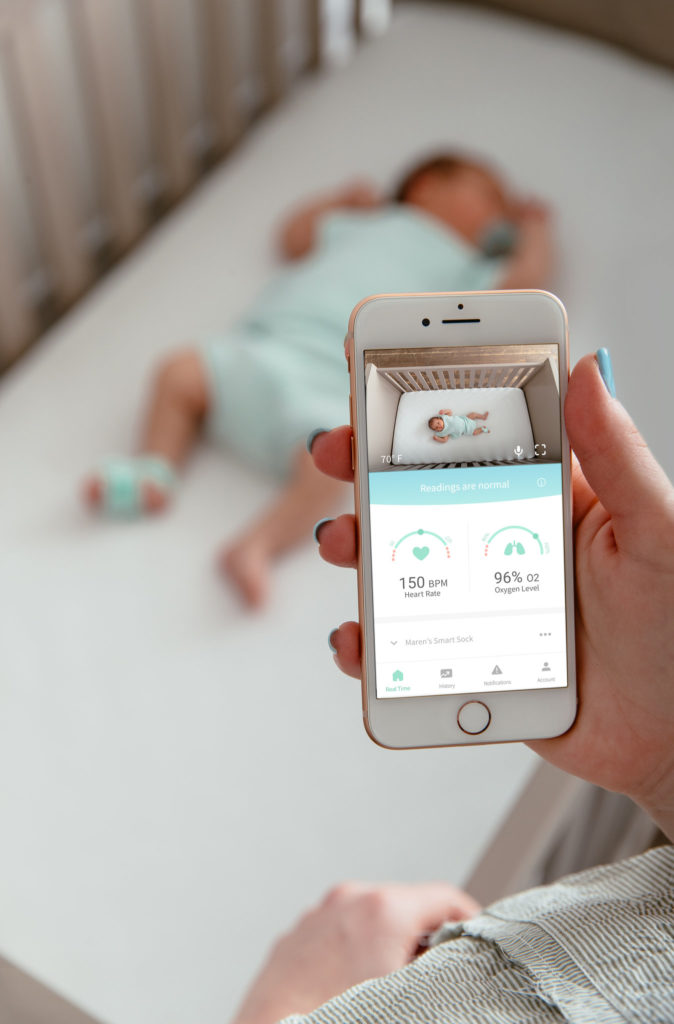
Baby Health Monitor
As mentioned before, as new mothers we can’t help worry about our newborn’s health – Is he breathing well? Is his heartbeat within the normal range? This innovative device is a smart sock-like device that wraps comfortably around your baby’s foot and uses clinically-proven pulse oximetry to track heart rate, oxygen levels and sleep. All you need to do is then connect the Smart Sock to your smartphone and stream real-time data as well as get notifications.
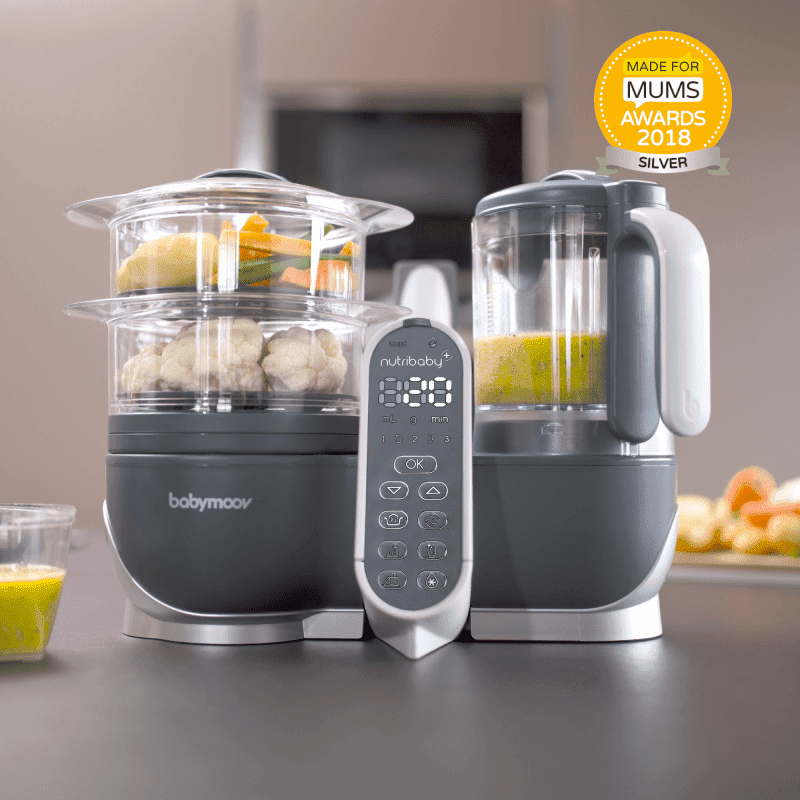
Sterilising and Weaning Accessories
During your baby’s first 6 months you are advised to breastfeed or feed your baby formula milk. During this time, it is important to sterilise your baby’s feeding equipment, so as to eliminate any trace of bacteria. After these 6 months, you can start weaning your baby, offering different vegetables and fruits. What better way to be prepared other than having this innovative device? A 5-in-1 multi-function food prep station that provides you with everything you need from late pregnancy to your baby’s first years of life.
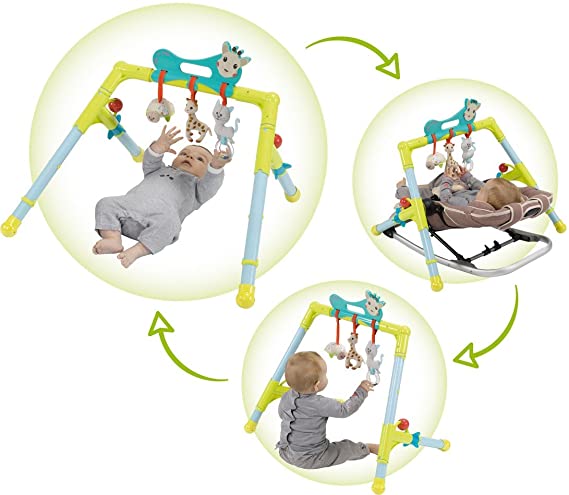
Baby Toys
Stimulating a child’s mind should start from as early as possible. With baby toys and accessories such as this, lying on their back, your baby awakens with the activities, comfortably reclining in their bouncer chair, they discover the activities, and sitting up, they can enjoy handling the accessories.
Post-Natal Visits by Discharge Liaison Midwives
Before being discharged from the hospital after giving birth to your baby, you will be asked whether you would like a midwife to come to your house for a couple of checkups for free. These checkups usually happen every couple of days within the first two weeks after discharge, for about 3 times.
During these visits, the midwife will ask you whether you have any concerns about yourself and your baby. You may discuss any issues you may be having through your first couple of days at home with your newborn baby.
If you have had a cesarean, episiotomy, or you needed stitches after giving birth, the midwife will also ask for consent to check and see if your stitches are healing well, giving you any advice if need be.
Breastfeeding Walk-In Clinic
The Breastfeeding Walk-in Clinic is situated on the first floor at the Out Patients Department, Mater Dei Hospital. At this clinic, mothers are welcome to come along with any breastfeeding queries or just for reassurance that everything is going well. Breastfeeding mothers can also have their babies weighed by the midwives at this clinic especially if they are unsure whether their babies’ nutritional needs are being met.
If you have chosen to breastfeed your baby, you can trust that you will receive correct advice and guidance through the Breastfeeding Clinic. You may also go and contact them any time for free if you feel the need to on 2545 4445. If you reach the answering machine do leave them a message and they will get back to you as soon as possible.
Due to Covid-19 we highly suggest that you contact the Breastfeeding Clinic on 2545 4445 before going, and ask whether any precautionary measures are currently in place, just in case you are required to make an appointment for the time being due to the pandemic.
Perinatal Mental Health Service
After giving birth it is quite normal that a mother may suffer from baby-blues and later on post-natal depression. Women who get baby blues may feel very anxious and sensitive within the first few days/weeks after the birth. Post-natal depression may even start later on, at times a couple of months after the birth.
If you experience unexplained sadness, anxiety, crying and such negative symptoms, please know that you are not alone and that this happens much more than we are made to think. Mater Dei Hospital offers the Perinatal Mental Health Service at the Antenatal Clinic, whereby a team of professionals can help you with your situation. For more information you may call them on 25457410 or 79701767.
6 Week Postpartum Checkup
Around the 6th week after the birth of your baby, you are advised to go for a checkup either at your own GP or at your nearest Health Centre. During this 6 week postpartum checkup you are offered a gynae check-up which includes a pap-smear test, as well as advice about contraception. You will also have the opportunity to discuss any other issues or concerns you may have at the time.
Well Baby Clinic
Well Baby Clinics provide a thorough checkup for the baby starting at around 6 weeks. This visit is commonly scheduled on the same day as the 6 Week Postpartum Checkup for the mother.
During this checkup, the baby is examined in terms of development: weight, length and head circumference are measured and logged into the baby book for ongoing monitoring. The parent/guardian is also given advice on the baby’s nutrition, weaning, care and safety. The baby is also given appointments for upcoming necessary immunisation doses.
Home Start Malta
Home Start Malta is a Non-Profit Organisation run by trained volunteers who are parents themselves or who have direct parenting experience. The aim of Home Start Malta is to give a helping hand to families with at least one child under five years old who may be feeling overwhelmed when it comes to coping from a day to day basis.
Home Start Malta volunteers offer support by talking and listening to the parent, giving a helping hand during school or hospital appointments, encouraging healthy child development through play, allowing respite in cases where there is challenging behaviour, multiple births or many young children, as well as help with shopping and cooking.
Families who feel the need to make use of such a service are encouraged to phone on 9901 8398 or email [email protected]. Home Start Gozo is also available through 99557744.

This article has been sponsored by Bump & Me, a local online shop where you can find everything you need from the moment you get your positive pregnancy test result to caring for your newborn baby and beyond.
The Women for Women Foundation seeks to empower women with the necessary tools to become independent and able to fully support themselves and their children whilst taking control of their lives. The foundation offers emergency support, educational support and mentoring to all women needing it.
Would you like to share your positive pregnancy test experience with us? Send us an email at [email protected]
References
Health Promotion and Disease Prevention Directorate. (2018). You are not alone! Perinatal Mental Health Guide. Accessed on 3rd October 2020 at https://deputyprimeministercms.gov.mt/en/health-promotion/Documents/library/publications/Perinatal%20Mental%20Health%20Leaflet%20(English)%202018%20FINAL.PDF
Ministry for Health. Breastfeeding Clinic. Accessed on 4th October 2020 at https://deputyprimeminister.gov.mt/en/MDH/Pages/MDH-Breastfeeding-Clinic.aspx
Adams, J. (N.D.). You’re Pregnant: The Magazine for Today’s Parents. Special Delivery Ltd.
Claire Galea is a mum of three currently reading for a Degree in Nursing at the Faculty of Health Sciences, University of Malta, as a mature student. She is keen about holistic patient-centered care as well as public education about health-related subjects, which she frequently writes about on Wham as a Content Writer and Website Editor.
Claire is also passionate about spreading awareness on the negative effects that domestic abuse leaves on its victims’ mental, emotional, social and physical wellbeing. She is the author of two downloadable ebooks, namely Heal Your Life Forever and 5 Simple Steps To Creating The Life Of Your Dreams.
Click here to check out Claire’s full bio as well as a list of all her Wham published articles



